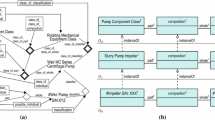Abstract
In order to adapt to changes in industrial world (customers and markets) and to competition, to create economic or strategic partnerships with external players or simply to integrate a connector to exchange information between the various services and software of a company, it is essential to have the necessary software tools (by development or deployment) that guarantee effective communication between the various parties, which are often heterogeneous and not known in advance, and overcome certain difficulties such as the multiplicity of information sources and the quality of the data.
In such a context, the exchange or migration of data is a critical step. In order to facilitate the exchange, our approach aims at implementing federated interoperability with automated model transformation, supported by an interoperability evaluation, in order to ensure data retention despite the unforeseen uses (for example, some fields divert or mislabel) and to ensure their consistency during the transformation.
Access this chapter
Tax calculation will be finalised at checkout
Purchases are for personal use only
Similar content being viewed by others
References
Camarinha-Matos, L.M., Fornasiero, R., Afsarmanesh, H.: Collaborative networks as a core enabler of Industry 4.0. In: Camarinha-Matos, L.M., Afsarmanesh, H., Fornasiero, R. (eds.) PRO-VE 2017. IAICT, vol. 506, pp. 3–17. Springer, Cham (2017). https://doi.org/10.1007/978-3-319-65151-4_1
Dodgson, M.: Technological Collaboration in Industry: Strategy, Policy and Internationalization in Innovation, vol. 11. Routledge (2018)
Standard Computer Dictionary: A Compilation of IEEE Standard Computer Glossaries. IEEE (1990)
Chen, D., Doumeingts, G., Vernadat, F.: Architectures for enterprise integration and interoperability: past, present and future. Comput. Ind. 59(7), 647–659 (2008)
Fortineau, V., Paviot, T., Lamouri, S.: Improving the interoperability of industrial information systems with description logic-based models—the state of the art. Comput. Ind. 64(4), 363–375 (2013)
Leal, G.D.S.S., Guédria, W., Panetto, H.: Interoperability assessment: a systematic literature review. Comput. Ind. 106, 111–132 (2019)
DoD, U.S: C4ISR Architecture Working Group (AWG): C4ISR Architecture Framework Version 2.0, Washington DC, December 1997
Fewell, S., Clark, T.: Organisational Interoperability: Evaluation and Further Development of the OIM Model. Defence Science and Technology Organisation Edinburgh, Australia (2003)
Dibowski, H.: Semantic interoperability evaluation model for devices in automation systems. In: 22nd IEEE International Conference on Emerging Technologies and Factory Automation (ETFA), pp. 1–6. IEEE, September 2017
Tolk, A., Muguira, J.A.: The levels of conceptual interoperability model. In: Proceedings of the 2003 Fall Simulation Interoperability Workshop, vol. 7, pp. 1–11. Citeseer (2003)
Guédria, W., Naudet, Y., Chen, D.: Maturity model for enterprise interoperability. Enterp. Inf. Syst. 9(1), 1–28 (2015)
IDEAS Consortium: IDEAS Project Deliverables (WP1-WP7). Public Reports (2003)
IDABC, Enterprise, and D. G. Industry: European interoperability Framework for pan-European e-government services. European Communities (2004)
Panetto, H., Scannapieco, M., Zelm, M.: INTEROP NoE: interoperability research for networked enterprises applications and software. In: Meersman, R., Tari, Z., Corsaro, A. (eds.) OTM 2004. LNCS, vol. 3292, pp. 866–882. Springer, Heidelberg (2004). https://doi.org/10.1007/978-3-540-30470-8_100
Neghab, A.P., Etienne, A., Kleiner, M., Roucoules, L.: Performance evaluation of collaboration in the design process: using interoperability measurement. Comput. Ind. 72, 14–26 (2015)
Ensemble, C.: EISB Basic Elements Report. Envisioning, supporting and promoting future internet enterprise systems research through scientific collaboration (FP7-ICT-257548), deliverable D, vol. 2 (2011)
Da Silva, A.R.: Model-driven engineering: a survey supported by the unified conceptual model. Comput. Lang. Syst. Struct. 43, 139–155 (2015)
UML, OMG: Unified Modeling Language (OMG UML). Version 2.5. 1 UML (2017)
Kleppe, A.: A language description is more than a metamodel. In: Fourth international workshop on software language engineering, vol. 1, megaplanet.org, October 2007
OMG: Meta object facility specification. OMG document formal, version 1.4 (2003)
Czarnecki, K., Helsen, S.: Feature-based survey of model transformation approaches. IBM Syst. J. 45(3), 621–645 (2006)
Kahani, N., Bagherzadeh, M., Cordy, J.R., Dingel, J., Varró, D.: Survey and classification of model transformation tools. Softw. Syst. Model. 18(4), 2361–2397 (2018). https://doi.org/10.1007/s10270-018-0665-6
Tu, Z., Zacharewicz, G., Chen, D.: Building a high-level architecture federated interoperable framework from legacy information systems. Int. J. Comput. Integr. Manuf. 27(4), 313–332 (2014)
Chalmeta, R., Pazos, V.: A step-by-step methodology for enterprise interoperability projects. Enterp. Inf. Syst. 9(4), 436–464 (2015)
Del Fabro, M.D., Bézivin, J., Valduriez, P.: Weaving models with the eclipse AMW plugin. In: Eclipse Modeling Symposium, Eclipse Summit Europe, vol. 2006, pp. 37–44, October 2006
Yie, A.: A non-invasive approach for evolving model transformation chains. Doctoral dissertation, Universidad de Los Andes (2011)
Kataria, P.: Resolving semantic conflicts through ontological layering. Doctoral dissertation, University of Westminster (2011)
Emmert-Streib, F., Dehmer, M., Shi, Y.: Fifty years of graph matching, network alignment and network comparison. Inf. Sci. 346, 180–197 (2016)
Acknowledgement
This work is funded by the company Forterro Sylob, which will bring in real case studies.
Author information
Authors and Affiliations
Corresponding author
Editor information
Editors and Affiliations
Rights and permissions
Copyright information
© 2020 IFIP International Federation for Information Processing
About this paper
Cite this paper
Labreche, M., Montarnal, A., Truptil, S., Lorca, X., Weill, S., Adi, JP. (2020). Towards a Framework for Federated Interoperability to Implement an Automated Model Transformation. In: Camarinha-Matos, L.M., Afsarmanesh, H., Ortiz, A. (eds) Boosting Collaborative Networks 4.0. PRO-VE 2020. IFIP Advances in Information and Communication Technology, vol 598. Springer, Cham. https://doi.org/10.1007/978-3-030-62412-5_12
Download citation
DOI: https://doi.org/10.1007/978-3-030-62412-5_12
Published:
Publisher Name: Springer, Cham
Print ISBN: 978-3-030-62411-8
Online ISBN: 978-3-030-62412-5
eBook Packages: Computer ScienceComputer Science (R0)





